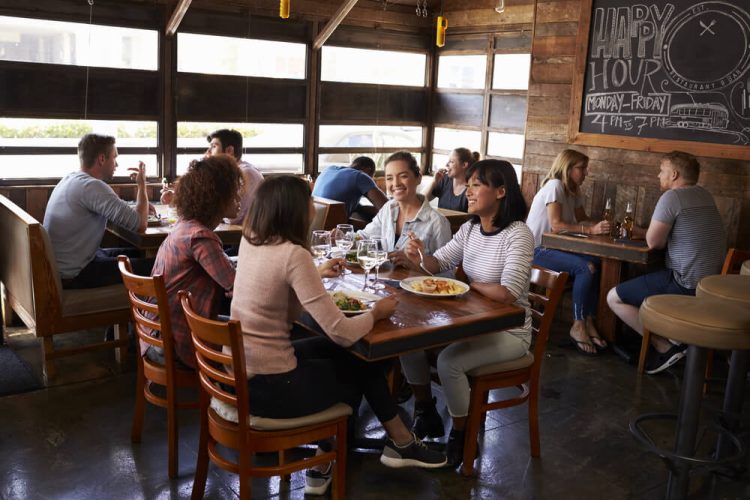
Many people have gone out to eat at a favorite restaurant only to come down with an upset stomach hours later. But does eating out cause illness, and should you be concerned? Many factors can impact food safety, and those factors are often out of your control when you go to a sit-down restaurant or even grab a burger in the drive-thru.
Along with having good health insurance, eating well is one of the best ways to reduce the chance of getting sick. If you love to eat out, it’s important to know whether your dietary habits could put your health at risk. This guide breaks down what you need to know about restaurant safety and your health.
The Delight and Dilemma of Eating Out
Eating out is an enjoyable pastime for many people. Going to a favorite restaurant is a go-to activity for celebrating a birthday, having a date night, or getting together with friends. In fact, 29% of Americans eat out at least once a week, making restaurant food a dietary staple for many people. Going to a restaurant is convenient and fun and takes the stress away from planning, shopping for, preparing and cleaning up after a meal. But is eating out unhealthy due to hygiene? Could it also introduce unexpected risks?
Some studies show that eating out could actually increase your risk of foodborne illness, also known as food poisoning. That could lead to increased health insurance claims and doctors’ bills. However, it can be hard to know how the actual risk of eating out compares to cooking at home.
People may be more likely to report sickness if they believe it came from a restaurant. Think about it: home chefs aren’t running to the CDC to report their own home cooking. However, if someone gets food poisoning from a popular establishment, they could make a report to prevent a potential public health hazard. Foodborne illness symptoms can also take time to show up, so it can be hard to pinpoint whether your tummy troubles came from that lunch buffet or your own kitchen experiments.
Regardless, you could still be taking on some extra risk when you eat out. After all, someone else is preparing your food behind closed doors. Restaurants have to adhere to health and safety regulations, but they also prepare meals in bulk all day long; it can be easy for potential issues to slip through the cracks.
Unearthing the Truth About Restaurant Hygiene
When it comes to professional kitchens, hygiene can be hit or miss. On paper, restaurants have to adhere to the FDA’s Food Code, and health inspectors could drop by at any time to investigate compliance. People who work with food often have to take courses to educate themselves on handling food safety.
In theory, this should make restaurants even safer and cleaner than your average home kitchen. Unfortunately, not all restaurants actually uphold these guidelines all the time. As a result, there are several issues that could end up making you sick:
- Food contamination: The cross-contamination that occurs when raw meat touches a surface can actually kill people. Anything that comes in contact with that meat needs to be thoroughly sanitized, including knives, the surface, and the worker’s hands.
- Allergens: Cross-contamination can also happen with allergens. If you have an allergy and the restaurant isn’t careful about cleaning surfaces and keeping ingredients separate, you could get seriously sick.
- Sanitation: Eating in unclean establishments is the first indication that you may be putting your health at risk. Although you can’t peek into the kitchen, you can still take a glance over the counter and in the bathrooms. Spilled food and dirt on the kitchen floor attract vermin and should be a red flag to eat elsewhere.
- Improper Temperature: This includes storing and cooking temperatures. All foods have a set temperature at which they must be kept and served. Deviation from the recommended temperatures can lead to potential illness.
- Sick Workers: Unfortunately, many restaurants pressure their workers to come in, even if they’re ill. That means a sick chef or server could be interacting with your food and potentially spread their illness to you.
- Spoiled Food: The problem with spoiled food is it doesn’t always look spoiled, but you can still get sick from eating it. If food sits out for a long time, it can go bad. Let your nose and taste buds be your guide. If it smells or tastes funny, be safe and send it back.
With all of these factors at play, it seems like the chance of getting sick is everywhere. Of course, many of these issues can also occur in your own home kitchen; ultimately, it’s important to pick clean establishments with good reviews to avoid potential issues. When eating out, use your best judgment to determine whether a restaurant seems safe and sanitary.

Investigating Food Safety at Buffets and Self-Service Eateries
Just like not all health plans are created equal, not all restaurants are created equal when it comes to health and safety. That’s especially true when it comes to self-serve buffets.
The main issue is temperature. Very high and very low temps can kill bacteria and keep it at bay, but room temperature causes bacteria to thrive. Anything between 40 and 140 degrees is known as the “danger zone” when it comes to food because bacteria grows so rapidly under those conditions.
At buffets, it can be easy for food to sit out at these temperatures. Before you eat at a buffet, do some research to find out how often they switch out trays. Some buffets may regularly dispose of uneaten food to prevent bacteria growth, making them a bit safer than those that let their food sit out for hours and hours.
Another potential challenge? Other customers. With self-serve dishes, high volumes of people will interact with the same tray of food. Even breathing on the food could spread germs, let alone sneezing into the buffet line or touching food with bare hands. To minimize risk, look for sneeze guards and other barriers that keep unwashed hands at bay.
Fast Food and Your Health: A Closer Look
What about fast food? Almost 60% of Americans eat fast food, and they often do so multiple times per week. Fast-food establishments can have many of the same issues as sit-down restaurants. However, your long-term health could be more of a concern than short-term food poisoning.
Along with getting that pesky fast-food odor in your car, fast food can be pretty unhealthy. Deep-fried delights are a nice treat every now and then, but if you’re eating fast food all the time, that could offset your diet and exercise, leading to cholesterol buildup, weight gain, and other issues.
Safe Handling of Leftovers
The potential health hazards of eating out don’t stop when you ask for your check. If you bring leftovers home, you’ll have to keep a few food safety rules in mind.
First, pop your takeout container in the fridge as soon as possible to keep your leftovers cold and out of the danger zone. Leaving them out on the counter or in the car could introduce new bacterial growth. For extra safety, transfer your food from the takeout box to an airtight Tupperware to lock in the freshness.
It’s also important to eat your leftovers before they go bad. As a general rule of thumb, leftovers can be safe in the fridge for three to four days, but that isn’t the end-all-be-all. Some foods might start tasting off the next day, while others are perfectly fine several days on. Before you dive in, do a smell test and check for any visible spoilage. And when in doubt, throw it out.
Upset Stomach? Freeway Can Help You Navigate Health Insurance in California
Although you can still be at risk of food poisoning at home, you can be exposed to some extra risks when you eat out. Cross-contamination, bacteria growth, and exposure to pathogens from sick employees and patrons can all make eating out a bit more risky.
You can’t really control whether you get food poisoning. The best you can do is try to be smart about your food and restaurant choices. But should you become sick, you can make sure you’ve got the best health insurance coverage through Freeway Insurance. We can help you find an affordable health insurance plan during open enrollment (November-December) or special enrollment the rest of the year if you qualify. Best of all, this service is completely free to you. Give us a call at 877-423-1508 to explore your health insurance options today.



